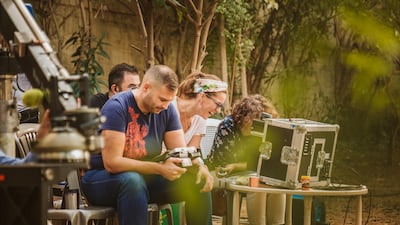For Kenton Oxley and Hassiba Freiha, making their new film was a labour of love in more ways than one. Co-directing as a couple, with Freiha as screenwriter and actress and Oxley as executive producer, presented both struggles and rewards.
"Working with your life partner is very interesting – both fun and challenging at times," says Freiha. "The most important aspect to me is communicating our thoughts as clearly as we can and being honest about what we envision each aspect of the film to achieve."
The couple's first feature, Farah, which is Arabic for joy, delves into issues close to Freiha's heart. It was shot in Lebanon, and marked the first time the couple have worked in the country. Freiha, who is of Lebanese-American descent, used the script to explore her own experience.
Filmed in a mixture of Arabic and English, Freiha intends for Farah to embody elements of the Lebanese experience: the mixture of languages and cultures; being pulled between a homeland in Lebanon and seeking opportunities abroad; a society modernising constantly, but often finding itself in conflict with entrenched traditional attitudes.

"I felt that Lebanon was the perfect microcosm of these complexities … the textures, the beautiful colours and the different languages all mixed. It just felt so much closer to who I was and I felt that was more genuine, coming from the story and my experience."
The film follows young Lebanese medical student Lina (Lebanese-French actress Stephanie Atala), who is struggling with her studies in America and is prescribed a mystery drug by her father back home in Beirut. As she becomes increasingly unstable, she returns to Beirut to recover and decides to search for her mother, who had disappeared years before. In doing so, she uncovers secrets about her family's past that have been buried to hide the shame caused by her mother's mental illness.
Fascinated by epigenetics – the study of how genes can be modified by factors other than an individual's DNA sequence – Freiha wanted to examine the subject of inherited trauma and how it affects generations of a family through both nature and nurture. For her, there was no better place to do so than Lebanon, where the scars of the country's 15-year civil war still mark many of its older inhabitants, and where mental health is still a taboo not often explored so openly.
The complexity of family relationships is a key and universal theme. In exploring her background and coming to terms with who her parents are and why they behave as they do, Lina has a powerful coming-of-age experience that is intensified by her mental health and her efforts to find a balance between traditional values and her status as a modern, educated young woman. Equally, her father is forced to engage with his daughter's development as an independent person who may not always behave as he would like. These themes, Freiha says, were drawn from her own experience and took many twists and turns as she attempted to address them in the script.
"For me, the film is really about a family coming to terms with a belief system that isn't what they grew up with, or what they had been told by society, or that they were taught," she says. "When this happens, I feel that could shake up somebody's world, you know? A belief system is like a foundation that you have depended on your whole life, and if that foundation starts to crumble, you will crumble."
While the film examines the legacy of Lebanon's civil war, it was never intended to be a look at politics directly. The first day of shooting, however, happened to coincide with the beginning of Lebanon's anti-corruption protests late last year. Oxley says the themes inevitably bled into the fabric of the film, adding yet another dimension to the complexity and dynamism of Beirut as a setting for the issues Farah explores. "The 'revolution' here is one of the most colourful peaceful revolutions on the face of the planet. It's got life and vibrancy and that's what we're trying to get across [about Lebanon]," he says.
“That’s what the film is about: if you can resolve your inner strife, that can then multiply into what happens at a societal level. We’re seeing that the new generations are willing to deal with some of these issues, are willing to move on and are willing to look to the future.”
The visual impact of the film is not what one might expect from a story exploring often dark and painful topics. Instead, the colours captured on screen are bright and silky, and showcase the beauty and grandeur of Beirut. For Oxley, this was a vital element of the filming process.
"As a Brit, up until marrying a beautiful Lebanese woman, I thought Lebanon was a scary place," says Oxley. "And then you come here, and you find the most peaceful, engaging, wonderful creative, culturally aware people who are highly educated. You've got a massive diversity of landscape; you've got a place where you feel more alive than almost anywhere in the world. And I don't ever see that on camera.
"To me it's life; life is funny; it's beautiful; it's romantic; it's scary; it's full of horror, and to tell that purely through pessimistic eyes was a massive mistake to me. This film is coming from a root of joy, and that hopefully comes across in the visual style."
The film comes at a time when the world is taking notice of Lebanese cinema following the success of features such as The Insult and Capernaum. With their production company, Knockout, already an established force in the UAE, Oxley and Freiha hope Farah will contribute to making Beirut an international centre for film, and hope to film in the country again.
The two filmmakers believe that if Arabic-language entertainment focuses on addressing fundamental themes of the human experience, its success could extend far beyond the Arabic-speaking world.
"This is an international movie that happens to be shot in Beirut," says Oxley. "Hopefully, it's accessible even beyond the Arabic region and to the wider world. There is no reason why Lebanon can't go on to become the Hollywood of the Middle East."
Farah is currently in post-production


